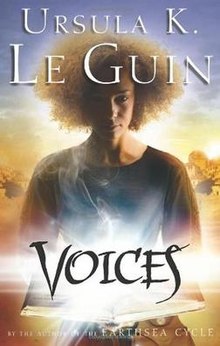Introduction
Voices by Ursula K Le Guin was the last book on my March reading list, and I actually finished on time, but I’m a little behind on posting the review. At any rate, I’m done reading it, so let’s take a look.
Reader’s Review: Voices
This is the first YA fantasy novel I’ve reviewed on my own without a request for a review here on the blog. Le Guin didn’t disappoint either. The piece is well-written and perfectly suited to this blog. I have read Le Guin before, as I read her Earthsea series when I was fourteen or fifteen. I loved those books, so I had high hopes for this book. And, as I said, Le Guin didn’t disappoint. She masterfully wove a story that captivated me with a rich story, a vibrant world, and dynamic characters.
The only real complaint I have is that it was in present tense at the beginning. I really don’t like that in books, but because it was first person and was almost written as an address from the MC to the reader, it was easier to move past. It did eventually switch to past tense as the full narrative got underway, and it was much easier to enjoy then.
The book is suitable for older children and teens. I’d say it’s fine content wise for anyone who’s at least twelve. The book does mention rape and abuse of women by the soldiers in the city where the book takes place, but nothing is actually shown or discussed in much detail. Similarly, there are one or two conversations the MC ends up roped into where one of the soldiers’ sons was talking about sex and trying to figure out if any women the MC knew would be available, but the MC shot the conversation down quickly and not much detail was actually given. The author keeps it PG-13. The language, to my recollection, was clean. Overall, I would recommend parental guidance for kids under twelve, but it is a YA book and stays appropriate for teens.
Writer’s Review of Voices
As the title hinted, our discussion today will center on Le Guin’s masterful use of religion in her work to bring the story and its civilizations to life.
I know some fellow authors who, as Christian authors, strongly object to religions besides Christianity being in their work. They won’t include any deities in their writing, made up or otherwise, that are not the Christian God or a representation of Him. I respect that, and if you’re in that camp, you’ll probably find this particular writer’s review rather useless to you. But if you do want to include deities and religions in your world for authenticity or other reasons, as many writers do, Le Guin has a lot to teach.
Her work Voices mainly represents two religions: that of the Alds and that of the people native to the city the Alds conquered before the book began. The two are in conflict to start because the Alds believe in and worship only one god, believe writing is evil, and see the gods the natives worship as demons that must be purged from the earth to make way for their god’s return.
To start with, they only conquered the city in an attempt to find the origin point of all evil, which their legends say is located in the city or the land around it. They march in and destroy all libraries, writings, and statues of the gods they find along with anything that they believe to be a temple.
The natives are then forbidden to worship any god besides the Alds’ god, and anyone found with books is killed. Naturally, this doesn’t sit too well with the natives who were used to their worship and to governing themselves. It creates a great amount of hatred, tension, fear, and suspicion.
Le Guin uses religion to add to the conflict as well as to bring the world to life. If you dislike stories where religion, even made up religion, takes a strong roll, Voices probably isn’t for you. But because religion is an indispensable part of the world, the conflict, and the story, Le Guin’s work is an excellent place to start learning how to use fantasy religions, or even real ones, to bring your story world to life and to add fuel to your fire of conflict.
I could go on and on about the ways Le Guin uses religion to add to her story, but I’m a firm believer in the idea that observation of how it’s done well is one of the best ways to learn when it comes to writing. So go read Voices. See how Le Guin uses religion and then apply the principles you see to your own work. You’d be surprised what this kind of practice and learning method can do for your writing. Good luck!

